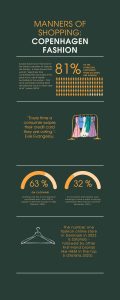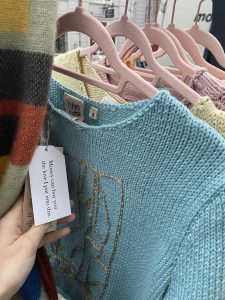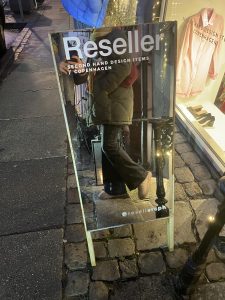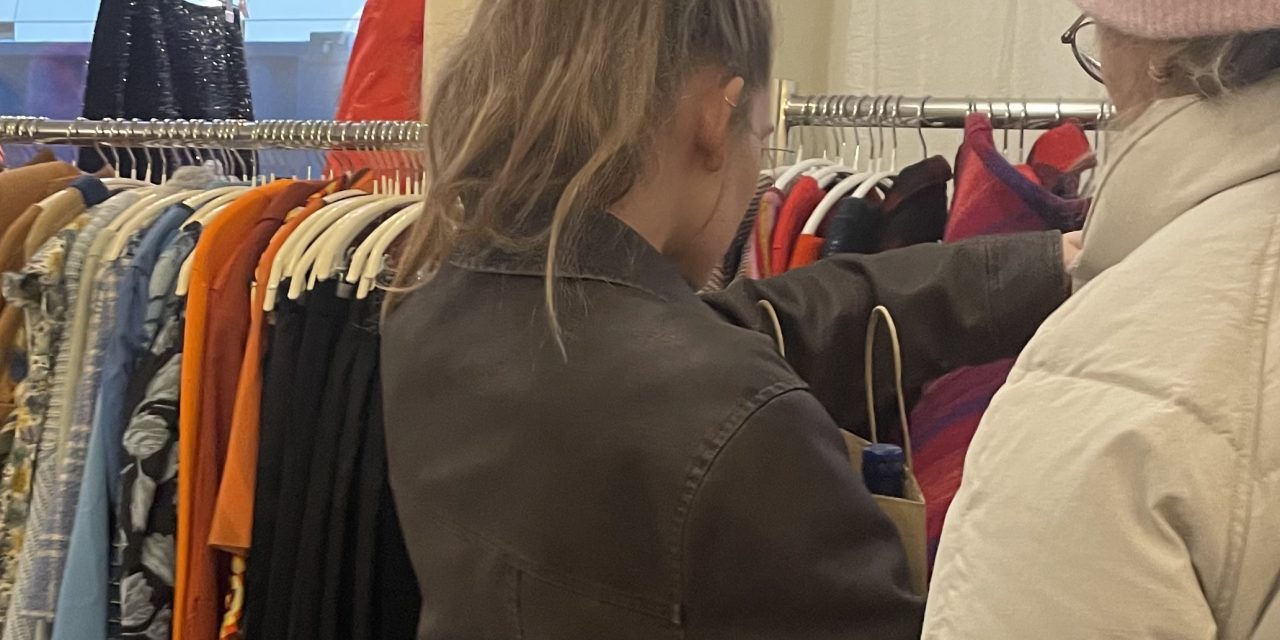The fashion week in Copenhagen (CHFW) is being claimed as the „most sustainable in the world“. At the same time, Zalando – which has faced several allegations about its supply chain policies – is this year’s main sponsor of the CHFW and last year’s most successful online clothing company in Denmark. This possible contradiction also raises the question at consumer level.
Ultimately, consumers decide which market wins in the supposedly sustainable metropolis – that of second-hand or first-hand clothing with Zalando being at the forefront. But what exactly is the problem with Zalando? Apart from the fact that Zalando sells new goods and is therefore one step behind the second-hand shops in terms of sustainability, there are other concerns that were thrown at the company in March 2023.

Infographic by Elena Nieberle: Consumer behavior of Copenhagen
In that month, Zalando had a general annual meeting where answers for sustainability in terms of supply chain were missing. The company could not guarantee the social responsibility for their workers. Isabell Ullrich from the coordination of the „Clean Clothes Campaign Germany“ says that in the case of Zalando „creating transparency and an overview of your own suppliers is the first point that is often missing. The suppliers’ conditions also need to be questioned.“
The Clean Clothes Campaign empowers global garment workers through education, mobilization, and collaboration on labor rights and systemic goals. So Ullrich claims for a more transparent process to ensure fair wages: “Just knowing how much of the money I pay the retailer for each T-shirt reaches the factory worker. This is information that is important in order to be able to pay living wages in the end.” So according to Ullrich, Zalando still has some catching up to do when it comes to sustainability. And yet it was the most popular online clothing brand among Danes last year, that are known for their sustainable living choices. The success of the company is hard to ignore.
The figures speak for themselves: Zalando’s turnover last year was USD 278.6 million, making it the most successful online store in Denmark. Followed by fast-fashion retailers such as H&M and Shein in the top 5, the first-hand market can be seen as the most successful when it comes to sales.

Picture by Elena Nieberle: Handmade clothes in sustainable stores in Copenhagen
In spite of that, when we talk about the customer level, economic factors are only one part of the picture. The decisive factor is also which preferences are present in the mindset in consumer behavior. After all, the famous expressions such as ‘Hygge’ for the ‘pleasant’ and ‘relaxed’, but also ‘decelerated’ life do not come from anywhere. Scandinavians, particularly Danes, are considered environmentally aware, as evidenced by their embrace of minimalistic lifestyles and the cultural philosophies.
In terms of fashion, this means that anyone walking around Copenhagen will quickly realise that the city has one second-hand shop after another. Research indicates that people in Denmark are more likely to consider buying second-hand clothing compared to other EU countries. The local first-hand shops – including big names such as Ganni, Baum and Pferdgarten – also seem to put a lot of emphasis on sustainability. And so does Copenhagen Fashion Week. The second hand stores in the Danish capital have mainly some certain points in common: They have a well-curated option of clothing pieces, partly handmade, partly designer pieces with correspondingly high prices. The contradiction if the fashion city is also noticeable in the cityscape, because apart from all the small sustainable second-hand boutiques, are huge advertising campaigns for fast fashion providers such as H&M, which dangle from the walls of high-rise buildings.
What is left to ask is if buying Second Hand really is a more or even the most sustainable option of clothing consumption. Prof. Dr. Jochen Strähle, international fashion management specialist and Dean and Senator at Reutlingen University thinks that „Second Hand has its positive impact on sustainability, if I just replace one-by-one, so if I really reduce one new product by one Second Hand. But all the studies we conducted at Reutlingen University show that it does not happen. In reality the overall consumption rate is at least 1.3 until double of the amount“.

Picture by Elena Nieberle: Second Hand stores in Copenhagen




